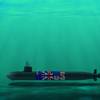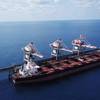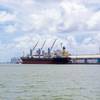UDT Speaker Addresses Maritime Security Threats
Military history teaches that the future is largely unpredictable, presenting those responsible for the defense of undersea security with a spectrum of challenges.
One of the keynote speakers at the UDT 2013 Conference, Vice Admiral Axel Schimpf, Chief of Staff in the German Navy, points out that in addition to the need for navies to counter international terrorism, organized crime, the proliferation of weapons of mass destruction and regional crises and conflicts, they also have to accommodate the fact that conflict can involve cyberspace, outer space and airspace as well as the maritime environment. This multiplicity must be approached on an integrated basis and, according to Vice Admiral Schimpf, strong navies are the best enabler.
Describing the comprehensive reorientation that the Bundeswehr is undergoing, Vice Admiral Schimpf said future assets need to be more adaptable, more flexible and more available in theater. He said that to address these issues Bundeswehr is looking at ships that will be better able to adapt to changing operational requirements and will enable intensive utilization supported by a multi crew concept.
Plenary speaker, Dr. Heiko Borchert, Managing Director of Sandfire, cited the changing face of globalization and maritime transport as a major challenge, explaining that we are witnessing a tectonic shift of power from the Atlantic to the Indo-Pacific. The maritime domain, which is at the heart of this change, will be increasingly contested. Growing competition for access to, maneuverability within, and use of the maritime domain will, said Dr. Borchert, very likely lead to increasing instabilities. He stated that energy and resource security will drive maritime security, saying that access to the respective resources had become an issue of concern in regions such as the Eastern Mediterranean, the Persian Gulf, the South China Sea, Latin America, and even in the Arctic.
Commenting on the use of the maritime domain for projecting power, Dr. Borchert said that today more and more state and non-state actors have the means to project power, with many preferring to shape the maritime domain according to their own interests. He cited the growing number of countries that strive to expand their Exclusive Economic Zone (EEZ), adding that more and more countries are investing in so called anti-access and area denial capabilities (A2AD). A2AD extends the strategic reach of one group of countries while at the same time making it much more difficult for others to project power into the respective maritime regions. Dr. Borchert stated that we can expect A2AD to be a key feature of future maritime conflicts - above and underwater.










